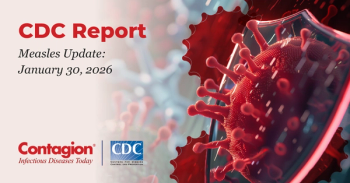
Full COVID-19 Vaccination Cuts Reinfection Risk in Half
Prior infection is not enough: COVID-19 vaccination reduces the risk of reinfection by 50%.
With the
Fully vaccinated individuals, though significantly less likely to experience severe or fatal infection, are susceptible to breakthrough COVID-19 infections with this highly contagious variant. Thus, the debate has been reignited: is prior COVID-19 infection enough to prevent reinfection? How effective are vaccines at preventing reinfection?
This article was originally published on
Vaccination after recovering from
In research from a team of Rhode Island investigators, completed primary COVID-19 vaccination series after recovery from a positive SARS-CoV-2 test was associated with a nearly 50% improved protection against reinfection among residents and employees of long-term congregate care (LTCC) facilities, and an even greater protection among the general population.
The findings add to the support of complete vaccination regimens against the pandemic virus among eligible persons, even after first infection.
Joseph W. Hogan ScD, of the department of biostatistics at Brown University School of Public Health, and colleagues conducted the cohort analysis of surveillance data among Rhode Island residents from March 2020 to December 9, 2021. The team sought to define population-based estimates of SARS-CoV-2 reinfection probability and the associated vaccine effectiveness of full regimens following an individual’s recovery from COVID-19.
The team stressed the “still poorly understood” nature and dynamics of SARS-CoV-2 reinfection. They cited a previous case-control trial of Kentucky residents that showed previously infected individuals were better protected against reinfection after completing the primary vaccination series.
“While evidence suggests that rates of hospitalization and death are substantially lower in individuals who have been reinfected, the dynamics of SARS-CoV-2 reinfection are still poorly understood,” investigators wrote. “A prior infection of SARS-CoV-2 confers some immunity to individuals who are not vaccinated, but this natural immunity wanes over time. Additionally, it has been shown that the JNJ-78436735 (Janssen), mRNA-1273 (Moderna), and BNT162b2 (Pfizer-BioNTech) vaccines offer substantial protection against COVID-19 infection and remain effective against newer variants.”
Their retrospective analysis of statewide surveillance data included COVID-19 vaccinations, laboratory-confirmed cases, hospitalizations and deaths associated with infection. As they noted, Alpha, Delta and wild-type variants of SARS-CoV-2 were prevalent throughout the observed period.
Eligible participants for assessment included Rhode Island residents aged ≥12 years previously diagnosed with COVID-19 who were unvaccinated at first population. Hogan and colleagues assessed the 3 subpopulations of LTCC residents and employees, as well as general population due to the disparate risk of morbidity and mortality of LTCC residents and the high-transmission risk faced by LTCC employees during the pandemic.
The final analysis included 100,517 participants: 3124 LTCC residents, 2877 LTCC employees, and 94,516 general population residents. Median LTCC resident age was 81 years; 53.6% were female and 64.7% were White. Median LTCC employee age was 41 years; 76.0% were female and 43.3% were White. Median general population age was 35 years;47.6% were female and 48.8% were White.
LTCC residents who remained unvaccinated reported the greatest probability of reinfection after 9 months at 13.0% (95% CI, 12.0 - 14.0), followed by the unvaccinated arms of the LTCC employees (10.0%; 95% CI, 8.8 - 11.5) and the general population (1.9%; 95% CI, 1.8 - 2.0).
Median time between COVID-19 infection and reinfection was 7.1, 6.9, and 7.9 months among unvaccinated LTCC residents, employees and the general population, respectively.
Complete primary vaccination series after infection was associated with 49% adjusted protection among LTCC residents (95% CI, 27 - 65), 47% protection among LTCC employees (95% CI, 19 - 65) and 62% protection among the general population (95% CI, 56 - 68) against COVID-19 reinfection.
Individuals from the general population reported a nearly 2-fold greater risk of reinfection when they were hospitalized from their primary SARS-CoV-2 infection (adjusted hazard ratio [aHR], 1.91; 95% CI, 1.56 - 2.33). Reinfection risk was approximately 26% lower among men than women (aHR, 0.74; 95% CI, 0.67 - 0.83), and 42% lower among persons who were symptomatic versus asymptomatic from their first infection (aHR, 0.58; 95% CI, 0.51 - 0.66). Individuals of Asian, Black and Hispanic or unknown race were also less likely to report reinfection than White individuals.
Such outcomes were not similar in the LTCC populations.
Hogan and colleagues concluded their findings were consistent with the referenced surveillance case-control study from Kentucky, adding that the observed increased risk of reinfection among LTCC residents and employees compared to the general population puts emphasis on the benefit of full vaccination against COVID-19.
“Our findings highlight the continued importance of vaccination, including after recovery from prior COVID-19, among LTCC residents and employees, who are likely at increased risk of reinfection owing to their older age and/or greater exposure to the virus in LTCC settings,” they wrote. “Employees and some residents or clients of other settings with greater COVID-19 exposure (eg, health care or correctional environments) may similarly experience high risk of reinfection and benefit from vaccination after recovery from COVID-19.”
The study, “
Newsletter
Stay ahead of emerging infectious disease threats with expert insights and breaking research. Subscribe now to get updates delivered straight to your inbox.

































































































































